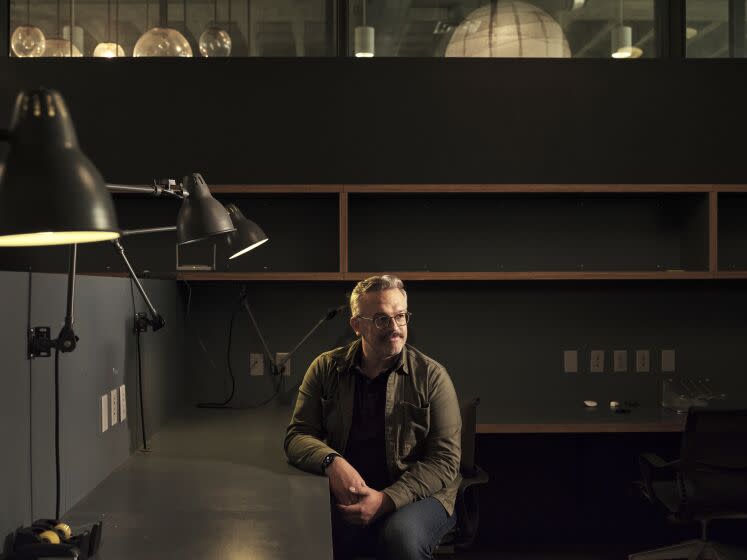How to direct a totally ad-libbed show -- and keep the improv a secret from its star

- Oops!Something went wrong.Please try again later.
When Jake Szymanski looks back on Amazon Freevee’s “Jury Duty,” the singularity is what strikes him: directing a part-scripted, part ad-libbed comedy with an unwitting star in Ronald Gladden, a sweet-natured 20-something who believes he’s appearing in a courtroom documentary but is actually surrounded by actors and improv comics. Though TV critics initially gave it a lukewarm reception, viewers immediately embraced “Jury Duty's" refreshingly uncynical tone, tightrope premise and endlessly post-able clips.
“Since then, the reviews have gone up,” says Szymanski. “I think our score on Rotten Tomatoes was, like, 40% and now we’re at 80%. I’ve never seen something transform like that.” To pull off such a monumental ruse took exhaustive prep, directing via hidden earpieces and the ability to make changes on the fly. “It’s actually the closest thing I’ve ever done to a multicam sitcom in the sense that we were putting on a live play for an audience of one,” Szymanski says. “Our brains were just constantly on.”
Read more: Those unfamiliar faces helped make 'Jury Duty' pop. Where did they come from?
There was a lengthy preproduction run-through. How did you rehearse after that?
Beyond talking to [the actors] in the morning and at night after they were filming with Ronald, it was often just reminding them, “We're all in this together. You're here for a reason. You're great at this. I have faith in you.” And the cast was excited about it. They were very game.
The fake trial lasted 17 days. Did you carve out moments where the actors could break character?
The actors got their union lunch break. What we’d normally do is pull Ronald for a solo interview, then everyone got to exhale and I could run into the room and talk with the actors. Sometimes we’d pull a couple of our actors, as if we were doing a group interview with them, but really they got to have a [breather]. Or they could leave the deliberation room to go to the bathroom and actually come sit with us [in the control room]. I'm sure everyone still felt like they were in character all the time. But we did try to build in rests for them.
Share a storyline that changed once you understood how Ronald’s mind worked.
One of our original storylines had [two jurors] starting a romance and maybe cheating on their partners, a bit of a scandalous relationship that developed during the [trial]. It's easy for a sitcom to have that storyline. But we ditched it once we realized that it might make Ronald not like them.
How many actors wore earpieces?
The most we had at any given time was five or six. It was more women than men, just because their hairstyles could hide it. We were nervous that Ronald would see them. I could talk to them and they could also [write] notes and pass them to other people in the room. The judge was an exception. We figured [Ronald would] just presume he has a hearing problem.
Staying in character for three weeks and not slipping up. That sounds terrifying.
Everyone embraced it. Some people even enjoy being terrified.
We want names.
Edy Modica [who played unpredictable free-spirit Jeannie] and David Brown [who played soft-spoken inventor Todd] are from the improv world. We asked them, “Is there any way you'd be willing to be in the hotel with him as well? You'll have time off the clock, but there’ll be extra times where we need you to be in character.” To them, it was like, “This is the most exciting thing I've ever heard. To stay in character and improvise into the night with someone every day? Yes! I'm excited that you came to me to do what I can do. This is my skill set. “
Read more: Did James Marsden ever stop worrying about 'Jury Duty'?
That’s impressive.
Yes, and you can quote me on this: Hire our cast for every job out there. They’re the best. I’m so proud of them. After our show, I feel like they get to walk into auditions feeling like Babe Ruth walking into a Little League game. I was like, “You guys can do anything. You pass the acting test. You created a character and were believable to a real person for three weeks straight.”
The finale featured behind-the-scenes footage, including slip-ups. Were there other times you thought your grand experiment was over?
There were lots of things. We were so nervous and cautious, concerned about every minute detail. Someone would walk into court in a suit without a briefcase, and we’d be like, [panicked voice] “What’s this person doing here? They don’t look real. They forgot their prop.” It seems silly in hindsight, but in the moment we were so worried.
How did you decompress from “Jury Duty”?
Right after our show wrapped, I went to Vancouver for a car commercial. None of the actors had dialogue. It was all people holding the steering wheel and giving cool looks. And I was like, “Wow, I just went from a Robert Altman movie on speed with 13 people talking in my ear at all times.” And even though that [car] shoot was intense, I was like, “I feel like I can breathe a little.”
This story originally appeared in Los Angeles Times.

